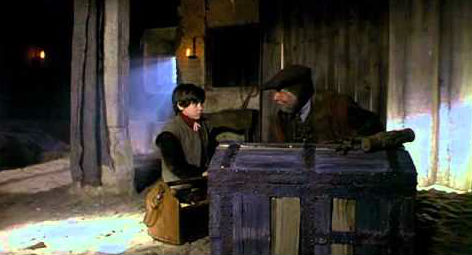In all the world's cinemas- from
American to Chinese - novels, poems, newspaper news and even
pharmacy patient information leaflets are adapted for the screen.
Some countries are so proud of their past, about what their
scriptwriters have written in the distant past, that they do not
object to the continuation of adapting their "classics" to the
screen. Why shouldn't Spain feel comfortable with a new film
version -the fourth - of "La verbena de la Paloma"? And with the
first one of "El sí de las niñas"? And with the second part of "El
Quijote", adapted for TV by Manuel Gutiérrez Aragón? And the third
part of "sonatas" written by Valle-Inclán? These classics are not a
resource for the cinema but rather, a must - a collective
obligation, both of the authors and the public.

My involvement in the LAZARO DE
TORMES film project and sharing the direction of the movie with
Fernán Gómez wasn't just a personal obligation but also a huge
pleasure. I don't know what the latter's reason was or the
producer's reason for allowing me to continue co-directing the
film. But as far as I am concerned, there was only one: friendship.
This sort of co-direction is a phenomenon that fortunately doesn't
happen too often, although it is not alien in the film world. In
this case, the presence of Fernán Gómez in the second stage of the
shooting, when I joined in, was imperceptible although very real.
His presence could be felt, first of all in his script which had
many notes written on it. Secondly, there were the actors he had
chosen himself and who had also appeared in his previous films. And
lastly, there was his technical team with whom he prepared the film
(set decorations, wardrobe, working guide-lines and plans...). But
above all, there was something there, which I don't know if I
should define as respect, fear or reverential friendship.
Fernando Fernan Gomez's view about
Spanish picaresque, official morality and the corruption of power
was shared by everyone, including myself, without any reservations.
Undoubtedly, in the final result, several clumsy moves made by me
and for which I'll be exclusively held responsible, will emerge,
but I hope that in this film some flashes of Fernan Gomez's genius
also appear.
Flashes of genius like those of
Rafael Álvarez who, from the first day in a sincere conversation,
became my best collaborator to implement this difficult project.
Rafael was not only the promoter of the film, but guardian of the
final product.
When the film premieres, as usual,
there will be some specialist who will think or say that this one
or another episode of the novel is missing. Because of that, I must
make it clear that the film is not a screen adaptation of
"Lazarillo de Tormes", written by an anonymous author a long time
ago, but rather "Lázaro de Tormes", a free version of this classic
work written by Fernán Gómez for the theater. There are things
missing in the film but I hope that there are no unnecessary
elements in it. That is something, as always, for the public to
decide. I cannot predict the future but I do hope that the film is
well received, not just by the public but also the producer, the
actors and my family. And what is more important, I also hope that
screen adaptations of the classics might, in the not-too-distant
future, become a new gold mine for Spanish cinema just as
children's films, "cuplés" (variety songs) or the cowboy movies
made in Almeria were in years gone by.
JOSÉ LUIS GARCÍA SÁNCHEZ.